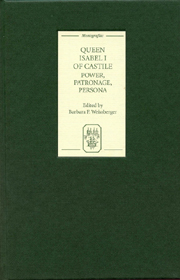Book contents
- Frontmatter
- Contents
- List of Contributors
- Acknowledgments
- Introduction: “Questioning the Queen, Now and Then”
- PART 1 INFLUENCE: ARAGON, PORTUGAL, AND NORTHERN EUROPE
- Part 2 Patronage: Reciprocal Relationships
- Part 3 Period: From Medieval to Modern
- “The Artistic Patronage of Isabel the Catholic: Medieval or Modern?”
- “Conflictive Subjectivity and the Politics of Truth and Justice in Cárcel de Amor”
- “Juan de Anchieta and the Rest of the World”
- “Inventing the Catholic Queen: Images of Isabel I in History and Fiction”
- Works Cited
- Index
“Juan de Anchieta and the Rest of the World”
from Part 3 - Period: From Medieval to Modern
Published online by Cambridge University Press: 12 September 2012
- Frontmatter
- Contents
- List of Contributors
- Acknowledgments
- Introduction: “Questioning the Queen, Now and Then”
- PART 1 INFLUENCE: ARAGON, PORTUGAL, AND NORTHERN EUROPE
- Part 2 Patronage: Reciprocal Relationships
- Part 3 Period: From Medieval to Modern
- “The Artistic Patronage of Isabel the Catholic: Medieval or Modern?”
- “Conflictive Subjectivity and the Politics of Truth and Justice in Cárcel de Amor”
- “Juan de Anchieta and the Rest of the World”
- “Inventing the Catholic Queen: Images of Isabel I in History and Fiction”
- Works Cited
- Index
Summary
One of the best things that the age of Isabel and Fernando left behind is a repertory of sacred music. We have a fair amount of it – impossible to count accurately at the moment for all the question marks and asterisks, but certainly a couple of hundred pieces, including at least twenty Masses – and at its best it is very fine music indeed. I enthusiastically recommend this music to anyone who wants to listen. I also think it contains a story that can shed light on Isabel and her goals.
To put it broadly and somewhat bluntly, at the time that the Catholic Monarchs were coming to power, Spanish church music, at least so far as we can tell today, did not amount to much. Manuscripts from the 1470s and 1480s (the Cancionero musical de la Colombina and the Spanish section of Paris 4379 are the most useful specimens) show two distinct kinds of sacred music. One kind is relatively sophisticated, with complex counterpoint and a respectable level of variety and imagination, but most of this turns out to be either imported from the prestigious Franco-Flemish areas or written locally by composers who emigrated from the north, the most eminent being Juan de Urrede (fl. ca. 1451–82), born Johannes de Wreede in Bruges. The native product of the other kind tends to be much simpler – mostly anonymous and often closely tied to the chant, which typically appears as a rigid cantus firmus in one of the voices, and with two or three new voices added above and below, harmonizing the chant or ornamenting it a bit but adhering to it, or each other, rather closely.
- Type
- Chapter
- Information
- Queen Isabel I of CastilePower, Patronage, Persona, pp. 169 - 185Publisher: Boydell & BrewerPrint publication year: 2008



